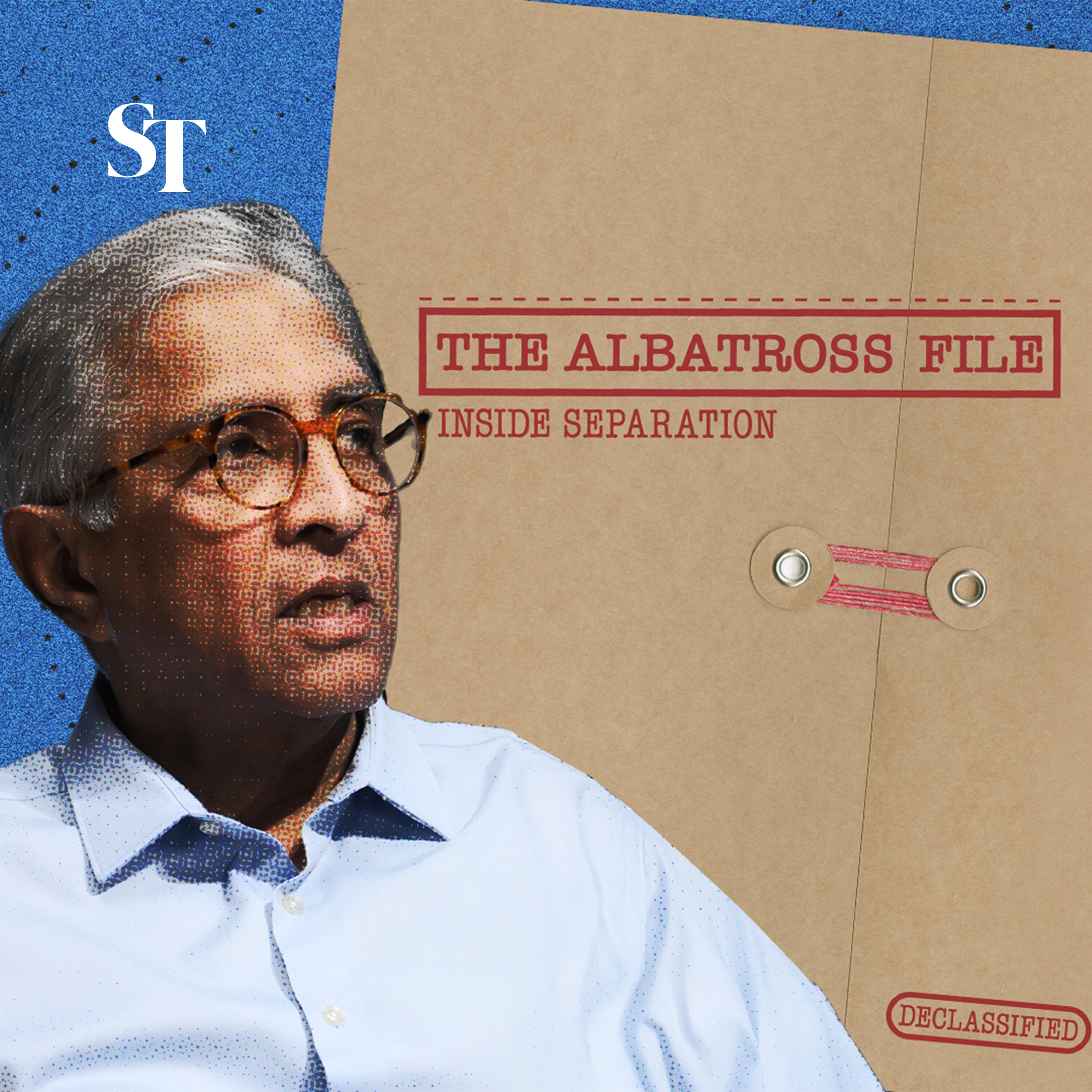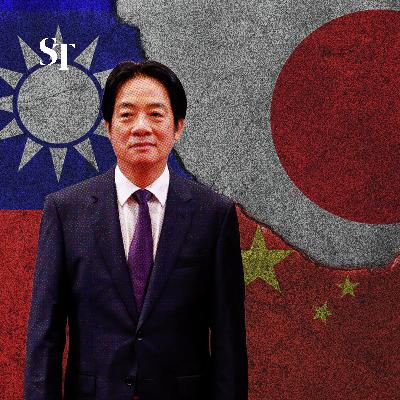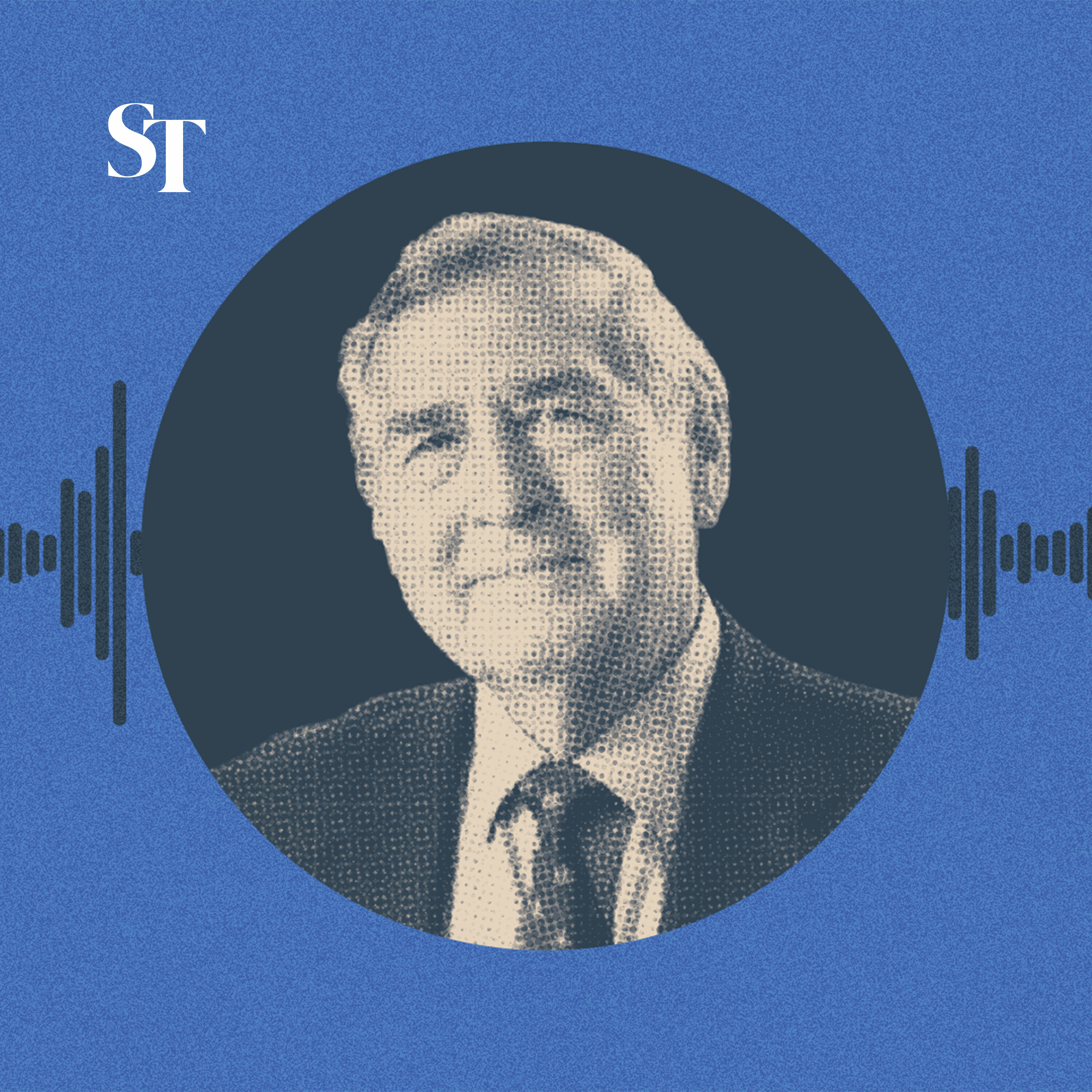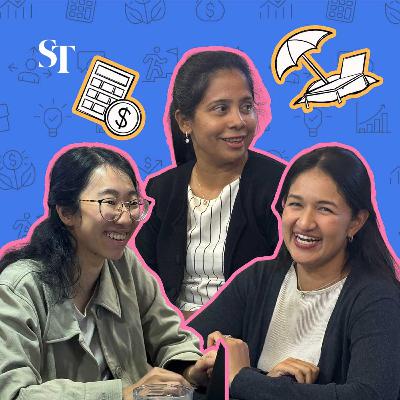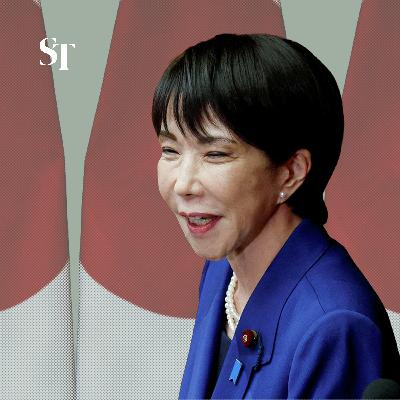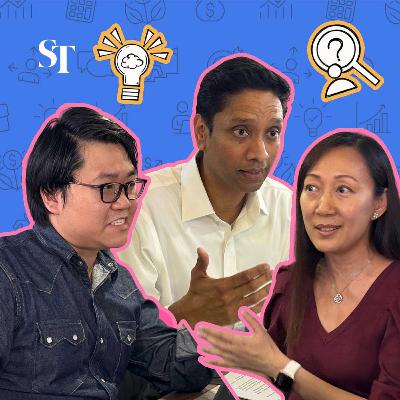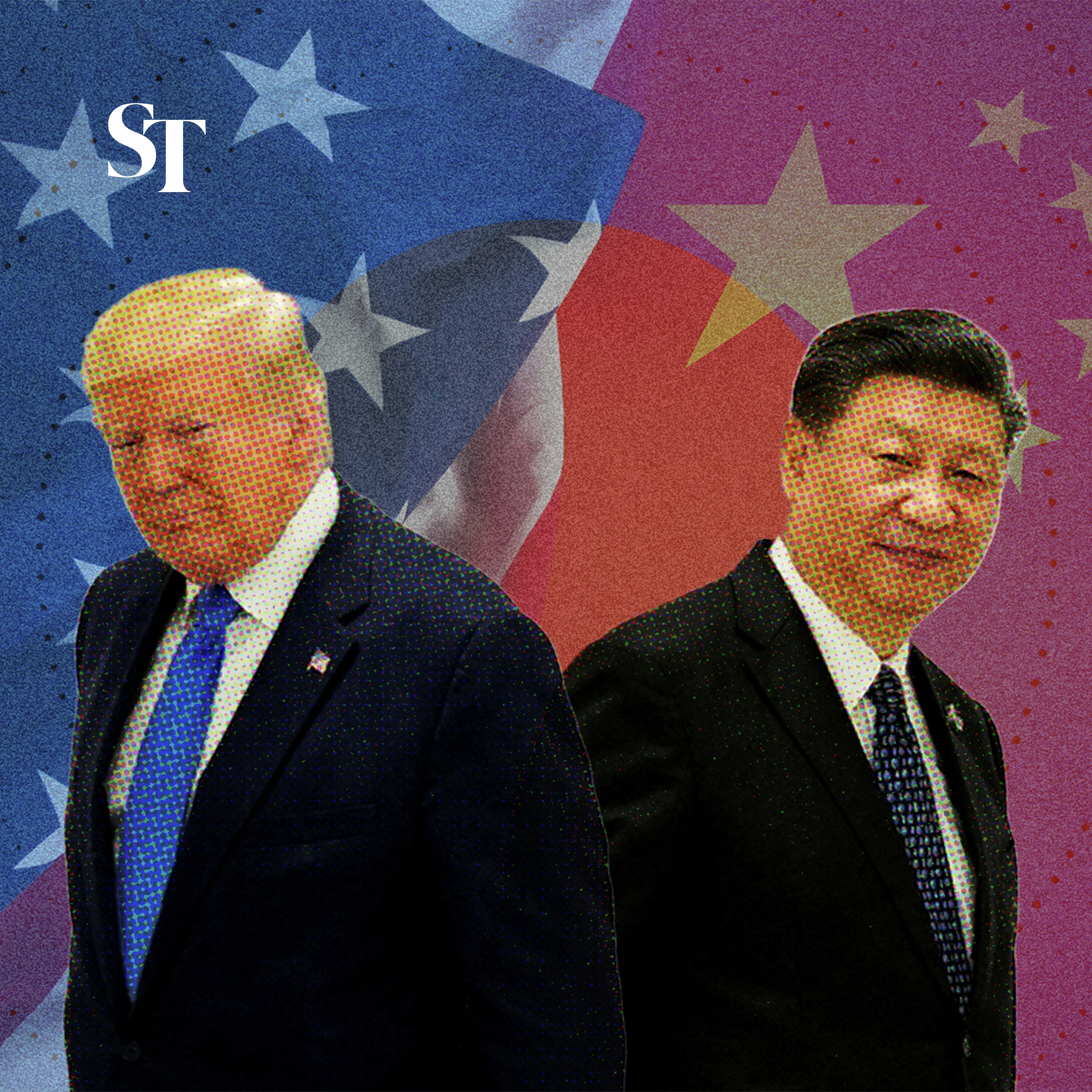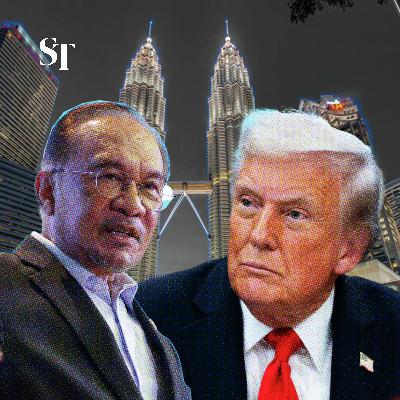Discover The Straits Times Podcasts
The Straits Times Podcasts

The Straits Times Podcasts
Author: The Straits Times
Subscribed: 793Played: 38,953Subscribe
Share
© 2025 The Straits Times
Description
Synopsis: Almost every weekday, our ALL-IN-ONE channel showcases discussions on Singapore youth perspectives and social issues, geopolitics through an Asian lens, health, climate change, personal finance and career.
Follow our shows on your favourite audio apps Apple Podcasts, Spotify or even ST's app, which has a dedicated podcast player section.
Produced by podcast editor Ernest Luis & The Straits Times, SPH Media.
2136 Episodes
Reverse
Our guest reveals pioneer leaders’ differing views on Singapore’s Aug 9, 1965 split from Malaysia. Synopsis: The Straits Times’ chief columnist Sumiko Tan speaks to Janadas Devan, senior adviser at the Ministry of Digital Development and Information, on how the The Albatross File: Inside Separation sheds fresh light on the decisions that led to Singapore’s independence. Edited by Susan Sim, the 488-page volume is co-published by Straits Times Press and the National Archives of Singapore, and was launched by Senior Minister Lee Hsien Loong on Dec 7 alongside an exhibition at the National Library. Mr Janadas, who coordinated the book, explains that Singapore’s 1963 merger with Malaysia was fraught from the outset, with the 1964 race riots further straining ties. Finance Minister Dr Goh Keng Swee kept a private file he code-named “Albatross”, a reference to the bird in Samuel Taylor Coleridge’s famous 1798 poem, The Rime of the Ancient Mariner, symbolising the burden of the troubled merger. Documents inside the file range from an early Cabinet memo by Prime Minister Lee Kuan Yew to the final Separation Agreement, and includes Dr Goh’s handwritten notes of his meetings with Malaysian leaders. Mr Janadas highlights how merger with Malaysia was a fundamental aim of Mr Lee’s People’s Action Party. It is something young Singaporeans today might find hard to understand, he acknowledges. But the merger was problematic, and proposals for a looser federation eventually collapsed, derailed by unclear terms and British anxieties as Indonesia’s Confrontation was then raging. Dr Goh led the talks for Singapore, navigating sensitive issues and political tensions. Within the Singapore leadership, views differed on whether Singapore should — or could — make it alone. Dr Goh pushed for going separate ways as the best option, while ministers Toh Chin Chye and S. Rajaratnam opposed separation once they learnt of it. Mr Lee was deeply torn, but ultimately authorised the move. Within a few years, Singapore's leaders concluded that Separation was the best outcome for Singapore. Mr Janadas also reflects on his father, Mr Devan Nair, who was the only PAP MP voted into the Malaysian Parliament at the time. When the two sides separated, his father decided to stay on in Malaysia, only returning to Singapore in 1969. Highlights (click/tap above): 5:11 The political climate of the 1960s 7:59 Why young Singaporeans may struggle to understand why the PAP pushed for merger with Malaysia 9:32 Early trouble after merger in 1963; Umno lost 3 seats it contested in Singapore GE to PAP’s Malay candidates 13:13 Was a looser federation ever an option? 17:23 The role of the British as Singapore and Malaysia leaders tried to work through their disagreements 18:35 What did Lee Kuan Yew mean by making life intolerable for the Malaysian leadership? 27:35 Diverging views: Lee always wanted a looser federation but Dr Goh felt separation was the answer 32:45 How Mrs Lee says that the closest her husband came to a nervous breakdown was August 9th, 1965 39:03 Janadas on how his father, Devan Nair, refused to accept Separation at first, before being convinced by Lee to eventually return 44:32 Do Singaporeans today underestimate how fragile the nation’s early years were? Buy the book: The Albatross File: Inside Separation (Standard/Collector’s Editions) https://www.stbooks.sg/products/the-albatross-file-inside-separation-collectors-edition Book tickets to the exhibition opening Dec 8 at the National Library Building: https://thealbatrossfile.nlb.gov.sg Host: Sumiko Tan (sumiko@sph.com.sg) Read Sumiko’s articles: https://str.sg/Jbhe Sign up for ST’s weekly Asian Insider newsletter: https://str.sg/sfpz Produced and edited by: Fa’izah Sani Executive producer: Ernest Luis Follow Asian Insider Podcast on Fridays here: Channel: https://str.sg/JWa7 Apple Podcasts: https://str.sg/JWa8 Spotify: https://str.sg/JWaX Feedback to: podcast@sph.com.sg SPH Awedio app: https://www.awedio.sg --- Follow more ST podcast channels: All-in-one ST Podcasts channel: https://str.sg/wvz7 Get more updates: http://str.sg/stpodcasts The Usual Place Podcast YouTube: https://str.sg/4Vwsa --- Get The Straits Times app, which has a dedicated podcast player section: The App Store: https://str.sg/icyB Google Play: https://str.sg/icyX --- #STAsianInsiderSee omnystudio.com/listener for privacy information.
Our guest expert explains the Americas-focused doctrine, inspired by the 19th-century Monroe Doctrine’s hemispheric stance. Synopsis: The Straits Times’ senior columnist Ravi Velloor distils 45 years of experience covering the Asian continent, with expert guests. In this wide-ranging conversation, Ravi speaks with Don McLain Gill, the eminent Filipino geopolitical expert and strategist, on declining US influence in Asia and the ‘Donroe’ Doctrine. They discuss the doctrine’s precursor, the Monroe Doctrine, and how key American allies in Asia are reacting to talk of the Donroe Doctrine. Ravi and Gill also discuss the potential of a ‘G-2', or Group of Two, which would include just the US and China. This, too, is a concept that many Asian nations with their own view of their place in the world, actively resist. Highlights: (Click/Tap Above) 1:24 What is the Donroe Doctrine? 4:47 Implications for Philippines 7:30 Reactions of allies Japan, South Korea, Australia, and quasi-ally India 13:10 ‘G2’ & the Donroe Doctrine: Clear concerns 16:11 A misguided strategy? US-China gap narrowing 19:47 Quad, Squad and increasing mini-laterals minus US Host: Ravi Velloor (velloor@sph.com.sg) Read Ravi's columns: https://str.sg/3xRP Follow Ravi on X: https://twitter.com/RaviVelloor Sign up for ST’s weekly Asian Insider newsletter: https://str.sg/sfpz Produced and edited by: Fa’izah Sani Executive producer: Ernest Luis Follow Asian Insider Podcast on Fridays here: Channel: https://str.sg/JWa7 Apple Podcasts: https://str.sg/JWa8 Spotify: https://str.sg/JWaX Feedback to: podcast@sph.com.sg SPH Awedio app: https://www.awedio.sg --- Follow more ST podcast channels: All-in-one ST Podcasts channel: https://str.sg/wvz7 Get more updates: http://str.sg/stpodcasts The Usual Place Podcast YouTube: https://str.sg/4Vwsa --- Get The Straits Times app, which has a dedicated podcast player section: The App Store: https://str.sg/icyB Google Play: https://str.sg/icyX --- #STAsianInsiderSee omnystudio.com/listener for privacy information.
We’re not Scrooges, we just want a less wasteful Christmas. Synopsis: Every first and third Tuesday of the month, The Straits Times analyses the beat of the changing environment, from biodiversity conservation to climate change. Christmas is just around the corner, and many are diving into frantic gift shopping and feast planning. But as Green Pulse hosts Audrey Tan and David Fogarty ask in this episode, do these traditions really spark joy – or do they just add clutter, waste and unnecessary spending? Tune in for practical tips on a clutter-free, eco-friendly Christmas, from smarter gift-giving to reducing food and packaging waste. Do you agree with their takes, or are they just being Christmas grinches? Highlights of conversation (click/tap above): 2:00 How to give sustainable gifts that people actually want 6:30 Regifting – faux pas or a sustainability win? 8:17 Is Christmas gift wrapping environmentally friendly? 15:11 The lowdown on reducing food waste at Christmas feasts 18:10 The debate over real vs fake Christmas trees Follow Audrey Tan on LinkedIn: https://str.sg/848W Read her articles: https://str.sg/JLM2 Follow David Fogarty on LinkedIn: https://str.sg/jcvy Read his articles: https://str.sg/JLMu Hosts: Audrey Tan (audreyt@sph.com.sg) & David Fogarty (dfogarty@sph.com.sg) Produced and edited by: Hadyu Rahim Executive producers: Ernest Luis & Lynda Hong Follow Green Pulse Podcast here and get notified for new episode drops: Channel: https://str.sg/JWaf Apple Podcasts: https://str.sg/JWaY Spotify: https://str.sg/JWag Feedback to: podcast@sph.com.sg SPH Awedio app: https://www.awedio.sg --- Follow more ST podcast channels: All-in-one ST Podcasts channel: https://str.sg/wvz7 Get more updates: http://str.sg/stpodcasts The Usual Place Podcast YouTube: https://str.sg/4Vwsa --- Get The Straits Times app, which has a dedicated podcast player section: The App Store: https://str.sg/icyB Google Play: https://str.sg/icyX --- #greenpulseSee omnystudio.com/listener for privacy information.
Gold prices have soared in 2025 but here are things to consider before buying your first gold bar. Synopsis: Every first and third Monday of the month, get a headstart in your personal finance and career with The Straits Times. Gold has never looked shinier, especially as a safe haven in a volatile world. It reached highs when things were the most volatile, with Trump’s tariffs and then the federal government shutdown. But should you buy gold, how do you go about it and what are the considerations to be taken first? In this episode, ST business correspondent Sue-Ann Tan looks at how to make good use of the current gold rally. Her guests are OCBC Managing Director of Investment Strategy Vasu Menon and ST business journalist Timothy Goh. Highlights (click/tap above): 1:34 Why have gold prices been soaring? 6:50 What does gold as a “safe haven” mean? 10:02 Is this the right time to buy gold? 16:00 When do gold prices come down? 19:56 Physical gold versus paper gold 24:13 Tips for first-time gold investors Read Sue-Ann Tan's articles: https://str.sg/mvSa Follow Sue-Ann Tan on LinkedIn: https://str.sg/A86X Host: Sue-Ann Tan (suetan@sph.com.sg) Produced & edited by: Amirul Karim Executive producers: Ernest Luis, Lynda Hong & Joanna Seow Follow Headstart On Record Podcast channel here: Channel: https://str.sg/wB2m Apple Podcasts: https://str.sg/wuN3 Spotify: https://str.sg/wBr9 Feedback to: podcast@sph.com.sg Get business/career tips in ST's Headstart newsletter: https://str.sg/headstart-nl SPH Awedio app: https://www.awedio.sg --- Follow more ST podcast channels: All-in-one ST Podcasts channel: https://str.sg/wvz7 Get more updates: http://str.sg/stpodcasts The Usual Place Podcast YouTube: https://str.sg/4Vwsa --- Get The Straits Times app, which has a dedicated podcast player section: The App Store: https://str.sg/icyB Google Play: https://str.sg/icyX --- Do note: All analyses, opinions, recommendations and other information in this podcast are for your general information only. You should not rely on them in making any decision. Please consult a fully qualified financial adviser or professional expert for independent advice and verification. To the fullest extent permitted by law, SPH Media shall not be liable for any loss arising from the use of or reliance on any analyses, opinions, recommendations and other information in this podcast. SPH Media accepts no responsibility or liability whatsoever that may result or arise from the products, services or information of any third parties. --- #headstartSee omnystudio.com/listener for privacy information.
The island’s diplomatic space may be shrinking but it wants to engage the world on its own terms Synopsis: Every fourth Friday of the month, The Straits Times will now analyse the hottest political and trending talking points, alternating between its Malaysia and Greater China bureaus. For November, host and deputy foreign editor Albert Wai connects with Taiwan correspondent Yip Wai Yee. They discuss Taiwan’s foreign policy preoccupations and the implications of the Beijing-Tokyo spat over remarks made by Japanese leader Sanae Takaichi on cross-strait tensions. Up against an increasingly dominant China, Taiwan is adopting what it calls “integrated diplomacy” as it seeks to buttress relations with like-minded partners. At the same time, the normalisation of so-called grey-zone tactics by the mainland against the island carries risks for Taiwan’s societal resilience and its ability to respond in the event of an actual attack. All eyes are on the next round of talks between American President Donald Trump and Chinese President Xi Jinping in the first half of 2026, as this could have far-reaching implications on Taiwan’s role on the global stage. Highlights (click/tap above): 1:49 Taipei’s “integrated diplomacy” 4:12 China-Japan spat over Taiwan 7:46 Shift in approach for cross-strait ties 10:35 What’s at stake when Trump and Xi meet in 2026 13:51 Leverage in tariff talks with the US 15:22 Grey-zone tactics 19:27 Breakthrough at European parliament 21:31 China Taipei or Chinese Taipei? Read more: https://str.sg/s4A7 Register for Asian Insider newsletter: https://str.sg/stnewsletters Host: Albert Wai (albertw@sph.com.sg) Produced and edited by: Fa’izah Sani Executive producer: Ernest Luis Follow Asian Insider Podcast on Fridays here: Channel: https://str.sg/JWa7 Apple Podcasts: https://str.sg/JWa8 Spotify: https://str.sg/JWaX Feedback to: podcast@sph.com.sg SPH Awedio app: https://www.awedio.sg --- Follow more ST podcast channels: All-in-one ST Podcasts channel: https://str.sg/wvz7 Get more updates: http://str.sg/stpodcasts The Usual Place Podcast YouTube: https://str.sg/4Vwsa --- Get The Straits Times app, which has a dedicated podcast player section: The App Store: https://str.sg/icyB Google Play: https://str.sg/icyX --- #STAsianInsiderSee omnystudio.com/listener for privacy information.
Our expert guest explains why he predicts both men will seek good vibes in 2026. Synopsis: Every third Friday of the month, The Straits Times gets its US bureau chief to analyse the hottest political and trending talking points. In this episode, US bureau chief Bhagyashree Garekar hosts her special guest - Harvard Professor Graham Allison - who tells her how he manages to read Trump right, by taking him seriously, looking at his patterns amid all his statements, and noticing the trend lines. Prof Allison is the Douglas Dillon Professor of Government at Harvard University where he has taught for five decades. He is a leading analyst of national security with special interests in nuclear weapons, Russia, China, and decision-making. He has also written books, including Destined for War: Can America and China Escape Thucydides’s Trap?, published in 2017. He also had another book out earlier in 2013 - Lee Kuan Yew: The Grand Master’s Insights on China, the United States and the World - which has been a bestseller in the US and abroad. Highlights (click/tap above): 2:31 How well do Trump & Xi vibe? Getting a sense of their agendas for 2026 7:34 What do Trump and Xi want from each other? 9:31 Will Trump get hawkish on China ahead of 2026 election? 13:52 Why is Trump muted on China-Japan spat over Taiwan? 18:50 Why Trump is different from any other US president 21:48 How today’s China looks at today’s America 24:43 Will China be the world’s sole superpower? Read Bhagyashree Garekar’s articles: https://str.sg/whNo Follow Bhagyashree Garekar on LinkedIn: https://str.sg/gD6E Sign up for ST’s weekly Asian Insider newsletter: https://str.sg/sfpz Host: Bhagyashree Garekar (bhagya@sph.com.sg) Produced and edited by: Fa’izah Sani Executive producer: Ernest Luis Follow Asian Insider Podcast on Fridays here: Channel: https://str.sg/JWa7 Apple Podcasts: https://str.sg/JWa8 Spotify: https://str.sg/JWaX Feedback to: podcast@sph.com.sg SPH Awedio app: https://www.awedio.sg --- Follow more ST podcast channels: All-in-one ST Podcasts channel: https://str.sg/wvz7 Get more updates: http://str.sg/stpodcasts The Usual Place Podcast YouTube: https://str.sg/4Vwsa --- Get The Straits Times app, which has a dedicated podcast player section: The App Store: https://str.sg/icyB Google Play: https://str.sg/icyX --- #STAsianInsiderSee omnystudio.com/listener for privacy information.
The popular Parking.SG app was supposed to help parking wardens issue summons. What happened? Synopsis: Every 3rd Wednesday of the month, The Straits Times examines not just vehicle prices but wider transport issues and trends connected to public and private transport. The Parking.SG app handles a million sessions a month, with under half of them being ended early and the motorist getting a refund. Half of them are Apple users, and the rest use Android smartphones. To think that it all began as a project to help the parking warden. In this episode, host and senior transport correspondent Lee Nian Tjoe speaks with Ms Amelia Fong, the product manager for Parking.sg and a policy officer at Open Government Products (OGP), a division of the Government Technology Agency of Singapore. Highlights (click/tap above): 2:21 The technology behind the original Parking.SG app 4:00 User statistics 8:00 Considerations to make the app senior-friendly 11:56 Annual hackathon for new technology solutions 19:00 Keeping the app working 24/7 20:57 Becoming a product manager at OGP Learn more about Parking.SG: https://www.parking.sg/ Read Lee Nian Tjoe's articles: https://str.sg/wt8G Follow Lee Nian Tjoe on LinkedIn: https://str.sg/iqkJ Read more COE articles: https://str.sg/iGKC Host: Lee Nian Tjoe (niantjoel@sph.com.sg) Produced & edited by: Teo Tong Kai Executive producers: Ernest Luis and Lynda Hong Follow Wheel Insights Podcast here and get notified for new episode drops: Channel: https://str.sg/iTtE Apple Podcasts: https://str.sg/iqW2 Spotify: https://str.sg/iqgB Feedback to: podcast@sph.com.sg SPH Awedio app: https://www.awedio.sg --- Follow more ST podcast channels: All-in-one ST Podcasts channel: https://str.sg/wvz7 Get more updates: http://str.sg/stpodcasts The Usual Place Podcast YouTube: https://str.sg/4Vwsa --- Get The Straits Times app, which has a dedicated podcast player section: The App Store: https://str.sg/icyB Google Play: https://str.sg/icyX --- #wheelinsightsSee omnystudio.com/listener for privacy information.
Why climate conferences are the only forum that can unite the world in fighting climate change. Synopsis: Every first and third Tuesday of the month, The Straits Times analyses the beat of the changing environment, from biodiversity conservation to climate change. Annual UN climate conferences, or COPs, have become giant gatherings that bring together governments, business, scientists, civil society and much more, showing the world wants to fight climate change, showcase solutions and rewire the global economy. But can COP30 and future climate summits really make a difference to heatwaves, floods, green jobs and climate finance – or are they just full of hot air? Join Green Pulse hosts Audrey Tan and David Fogarty as they unpack why climate COPs matter to everyday lives, jobs and politics in South-east Asia and beyond. Highlights of conversation (click/tap above): 1:59 Why are climate COPs so important? 3:40 More money needed for adaptation investments and tools to measure progress 7:46 How to scale climate cash up to US$1.3 trillion a year – that level of funding could transform communities in SE Asia 10:39 COPs: A showcase for solutions to cut emissions and boost adaptation 18:33 Boosting green jobs as nations focus on cutting emissions 22:49 The Paris Agreement targets: Driving regional partnerships to boost green investments and strengthen climate politics 26:31: A tale of the hare and the tortoise…. Follow Audrey Tan on LinkedIn: https://str.sg/848W Read her articles: https://str.sg/JLM2 Follow David Fogarty on LinkedIn: https://str.sg/jcvy Read his articles: https://str.sg/JLMu Hosts: Audrey Tan (audreyt@sph.com.sg) & David Fogarty (dfogarty@sph.com.sg) Produced and edited by: Hadyu Rahim Executive producers: Ernest Luis & Lynda Hong Follow Green Pulse Podcast here and get notified for new episode drops: Channel: https://str.sg/JWaf Apple Podcasts: https://str.sg/JWaY Spotify: https://str.sg/JWag Feedback to: podcast@sph.com.sg SPH Awedio app: https://www.awedio.sg --- Follow more ST podcast channels: All-in-one ST Podcasts channel: https://str.sg/wvz7 Get more updates: http://str.sg/stpodcasts The Usual Place Podcast YouTube: https://str.sg/4Vwsa --- Get The Straits Times app, which has a dedicated podcast player section: The App Store: https://str.sg/icyB Google Play: https://str.sg/icyX --- #greenpulseSee omnystudio.com/listener for privacy information.
More holidays a year sounds great but ensure they stay within budget by using these hacks. Synopsis: Every first and third Monday of the month, get a headstart in your personal finance and career with The Straits Times. Instead of saving for a home, young people are now saving for travel and leisure. Over half of young workers said saving for trips is among their top financial goals, a survey showed. So travel is clearly a top of mind issue for Singaporeans. But how do we budget for three trips a year? In this episode, ST business correspondent Sue-Ann Tan looks at how to achieve your vacation dreams. Her guests are Revolut’s Head of Strategy and Operations Ashley Thomas and ST travel journalist Sarah Stanley. Highlights (click/tap above): 2:23 How early do you plan for 2026’s trips? 4:00 Are more people doing three holidays a year? 8:00 How to set budgets for a trip 16:22 Using AI to plan holidays 18:00 Where are the upcoming popular spots? 21:00 Travel deals and ways to save money Read Sue-Ann Tan's articles: https://str.sg/mvSa Follow Sue-Ann Tan on LinkedIn: https://str.sg/A86X Host: Sue-Ann Tan (suetan@sph.com.sg) Produced & edited by: Amirul Karim Executive producers: Ernest Luis, Lynda Hong & Joanna Seow Follow Headstart On Record Podcast channel here: Channel: https://str.sg/wB2m Apple Podcasts: https://str.sg/wuN3 Spotify: https://str.sg/wBr9 Feedback to: podcast@sph.com.sg Get business/career tips in ST's Headstart newsletter: https://str.sg/headstart-nl SPH Awedio app: https://www.awedio.sg --- Follow more ST podcast channels: All-in-one ST Podcasts channel: https://str.sg/wvz7 Get more updates: http://str.sg/stpodcasts The Usual Place Podcast YouTube: https://str.sg/4Vwsa --- Get The Straits Times app, which has a dedicated podcast player section: The App Store: https://str.sg/icyB Google Play: https://str.sg/icyX --- Do note: All analyses, opinions, recommendations and other information in this podcast are for your general information only. You should not rely on them in making any decision. Please consult a fully qualified financial adviser or professional expert for independent advice and verification. To the fullest extent permitted by law, SPH Media shall not be liable for any loss arising from the use of or reliance on any analyses, opinions, recommendations and other information in this podcast. SPH Media accepts no responsibility or liability whatsoever that may result or arise from the products, services or information of any third parties. --- #headstartSee omnystudio.com/listener for privacy information.
Our guest expert looks at her political approach, as well as her personal side. Synopsis: The Straits Times’ senior columnist Ravi Velloor distils 45 years of experience covering the Asian continent, with expert guests. In this wide-ranging conversation, Ravi speaks with Professor Tomohiko Taniguchi, foreign policy adviser to the Cabinet of the late Prime Minister Shinzo Abe and one of the most authoritative voices on Japan about the ascend and likely impact of Sanae Takaichi. They discuss Ms Takaichi’s first diplomatic encounter with US President Donald Trump, her hardline approach to defence, and China, Japan’s shifting priorities in Asean as Philippines rises in salience and Indonesia declines, Tokyo’s dread of Trump’s ‘G-2’ talk, the future of the Quad security dialogue, and her approach to economic policy. They also discuss Ms Takaichi’s softer, personal side – her early life, propensity to ride powerful motorbikes, marriage to the same man twice and finally, the question: Now that Japan has its first woman PM, is it time to consider an Empress for Japan? Highlights (click/tap above): 1:00 Shinzo Abe’s protege? Yes, and no. 5:00 Asean summit and first encounter with Donald J Trump 10:00 Japan’s dread of Trump’s “G-2” talk 12:00: Defence thrust, and the nuclear question 18:30 China, Japan’s key neighbour 22:30 For Tokyo, Indonesia dips while Philippines rises 26:00 Is Quad dead in the water? 31:00 Japan and foreigners 36:10 Sanae Takaichi: woman, wife, rocker, biker 41:20 After woman PM, an Empress for Japan? Host: Ravi Velloor (velloor@sph.com.sg) Read Ravi's columns: https://str.sg/3xRP Follow Ravi on X: https://twitter.com/RaviVelloor Sign up for ST’s weekly Asian Insider newsletter: https://str.sg/sfpz Produced and edited by: Fa’izah Sani & Chen Junyi Executive producer: Ernest Luis Follow Asian Insider Podcast on Fridays here: Channel: https://str.sg/JWa7 Apple Podcasts: https://str.sg/JWa8 Spotify: https://str.sg/JWaX Feedback to: podcast@sph.com.sg SPH Awedio app: https://www.awedio.sg --- Follow more ST podcast channels: All-in-one ST Podcasts channel: https://str.sg/wvz7 Get more updates: http://str.sg/stpodcasts The Usual Place Podcast YouTube: https://str.sg/4Vwsa --- Get The Straits Times app, which has a dedicated podcast player section: The App Store: https://str.sg/icyB Google Play: https://str.sg/icyX --- #STAsianInsiderSee omnystudio.com/listener for privacy information.
Spoiler: Politics, and the private lives of politicians. Synopsis: Every first Friday of the month, The Straits Times catches up with its foreign correspondents about life and trends in the countries they're based in. For more than a century, it was quite accepted in France that Presidents and male politicians could have mistresses, and no one would pry into their private lives. But public attitudes are changing, and this is manifested in persistent curiosity about President Emmanuel Macron and his wife - who have now taken the unprecedented step of filing a lawsuit to battle scurrilous allegations. In this episode, ST's foreign editor Li Xueying hosts global affairs correspondent Jonathan Eyal, who takes his skewer to double standards, culture wars and conspiracy theories that are fuelling the change. Highlights (click/tap above): 1:48 Paris in summer: A hotbed of scandals 4:11 Climate and political heat 7:01 Changing political privacy norms in France 9:29 The role of social media and disinformation 13:31 Macron’s political challenges and scandals Read Jonathan Eyal’s article here: https://str.sg/cDua Read Li Xueying’s articles: https://str.sg/iqmR Follow Li Xueying on LinkedIn: https://str.sg/ip4x Sign up for ST’s weekly Asian Insider newsletter: https://str.sg/sfpz Host: Li Xueying (xueying@sph.com.sg) Produced and edited by: Fa’izah Sani Executive producer: Ernest Luis Follow Asian Insider on Fridays here: Channel: https://str.sg/JWa7 Apple Podcasts: https://str.sg/JWa8 Spotify: https://str.sg/JWaX Feedback to: podcast@sph.com.sg SPH Awedio app: https://www.awedio.sg --- Follow more ST podcast channels: All-in-one ST Podcasts channel: https://str.sg/wvz7 Get more updates: http://str.sg/stpodcasts The Usual Place Podcast YouTube: https://str.sg/4Vwsa --- Get The Straits Times app, which has a dedicated podcast player section: The App Store: https://str.sg/icyB Google Play: https://str.sg/icyX --- #STAsianInsiderSee omnystudio.com/listener for privacy information.
Vital need for insurance to bridge the region’s ‘protection gap’ and drive the green transition Synopsis: Every first and third Tuesday of the month, The Straits Times analyses the beat of the changing environment, from biodiversity conservation to climate change. Insurance is a safety net and is increasingly vital as climate change risks grow and as more people, homes and businesses are in the path of disaster. But in South-east Asia, the majority of people do not have access to insurance. And the region is facing worsening threats from floods, sea-level rise and heat stress. Only 5 to 7 per cent of all climate-related losses are insured in South-east Asia, says Mr Daniel Fairweather, head of food security systems and biodiversity at Howden, an insurance broking firm. But there is plenty of hope to bridge this “protection gap”, he tells Green Pulse podcast hosts Audrey Tan and David Fogarty. There are insurance products that can help communities when disaster strikes by rapidly releasing cash payments to meet emergency needs. Mutualised insurance risk pools that combine premiums can also pay out in times of need. Two things are key: Insurers need to work closely with governments and businesses to better assess climate risks and vulnerabilities. Secondly, spread the financial risk by building connections across the region, such as linking up local and national insurance mechanisms, such as risk pools. “Every risk is insurable,” Mr Fairweather says, adding that insurance coverage is also critical to accelerate green investments in the region. Have a listen, and let us know what you think! Highlights of conversation (click/tap above): 1:04 What are some of South-east Asia’s top climate change risks? 4:51 Will insurance losses increase mainly because of climate change or for other reasons, too? 9:10 What are some of the insurance products that can protect communities in the region? 16:06 In some places in the US, insurance coverage has been withdrawn. What’s the reason for this? 24:28 What about the role of insurance in boosting green initiatives in South-east Asia. Is it a catalyst? 28:28 Can the insurance industry thrive despite the rapid march of climate change? Follow Audrey Tan on LinkedIn: https://str.sg/848W Read her articles: https://str.sg/JLM2 Follow David Fogarty on LinkedIn: https://str.sg/jcvy Read his articles: https://str.sg/JLMu Hosts: Audrey Tan (audreyt@sph.com.sg) & David Fogarty (dfogarty@sph.com.sg) Produced and edited by: Hadyu Rahim Executive producers: Ernest Luis & Lynda Hong Follow Green Pulse Podcast here and get notified for new episode drops: Channel: https://str.sg/JWaf Apple Podcasts: https://str.sg/JWaY Spotify: https://str.sg/JWag Feedback to: podcast@sph.com.sg SPH Awedio app: https://www.awedio.sg --- Follow more ST podcast channels: All-in-one ST Podcasts channel: https://str.sg/wvz7 Get more updates: http://str.sg/stpodcasts The Usual Place Podcast YouTube: https://str.sg/4Vwsa --- Get The Straits Times app, which has a dedicated podcast player section: The App Store: https://str.sg/icyB Google Play: https://str.sg/icyX --- #greenpulseSee omnystudio.com/listener for privacy information.
Find out how to choose the right employers, training and career paths to ride the wave. Synopsis: Every first and third Monday of the month, get a headstart in your personal finance and career with The Straits Times. We are in the thick of it. Artificial intelligence (AI) has already taken root in our personal and professional lives, and is set to reshape society even more. How best to set ourselves up for success for the years to come? What is the support at hand to help us make better career choices? In this episode, host and ST correspondent Tay Hong Yi chats with Mr Dinesh Vasu Dash, Minister of State for Manpower, as well as for Culture, Community and Youth. MOS Dinesh shares more about who the hotly-scrutinised and recently launched Graduate Industry Traineeships (Grit) are meant for, and why it has taken the form it has. Joining the discussion is Ms Elsie Ng, director for talent solutions in Singapore for professional networking platform LinkedIn. She shares how both employers and workers are reinventing themselves for AI. This is a jam-packed episode that cannot be missed. Highlights (click/tap above): 5:43 What prevents people from taking the first step in upskilling? 9:17 How have skill requirements changed in recent times? 13:40 Huge demand in 'people' skills; why career research is important 17:36 What happens to those who find their efforts aren’t enough to keep up? 24:47 Grit is meant for those who can’t directly enter growth sectors 31:10 Nurturing ready trainees for when the role is eventually created Take the Career Health quiz: https://careerhealth.sg/quiz/ Read Tay Hong Yi's articles: https://str.sg/w6cz Follow Tay Hong Yi on LinkedIn: https://str.sg/AAxy Host: Tay Hong Yi (hytay@sph.com.sg) Produced & edited by: Amirul Karim Executive producers: Ernest Luis, Lynda Hong & Joanna Seow Follow Headstart On Record Podcast channel here: Channel: https://str.sg/wB2m Apple Podcasts: https://str.sg/wuN3 Spotify: https://str.sg/wBr9 Feedback to: podcast@sph.com.sg Get business/career tips in ST's Headstart newsletter: https://str.sg/headstart-nl SPH Awedio app: https://www.awedio.sg --- Follow more ST podcast channels: All-in-one ST Podcasts channel: https://str.sg/wvz7 Get more updates: http://str.sg/stpodcasts The Usual Place Podcast YouTube: https://str.sg/4Vwsa --- Get The Straits Times app, which has a dedicated podcast player section: The App Store: https://str.sg/icyB Google Play: https://str.sg/icyX --- #headstartSee omnystudio.com/listener for privacy information.
A grand bargain will be hard to strike at the upcoming US-China presidential summit, says a top trade expert. Synopsis: Every third Friday of the month, The Straits Times gets its US Bureau Chief to analyse the hottest political and trending talking points. In this episode, former US trade negotiator Wendy Cutler - who was recently a panellist at SPH Media’s Oct 9 Asia Future Summit - speaks with US Bureau Chief Bhagyashree Garekar to unpack what can be expected from President Donald Trump’s Asia trip. Highlights (click/tap above): 3:09 On the expected Trump-Xi meeting 6:11 What China wants out of the meeting 7:39 Wendy Cutler’s gut feel on the summit outcome 12:00 Did Singapore get the ‘best deal’ out of Trump? 14:10 Seoul may get a deal, not New Delhi 17:19 ‘We're gonna be living in a tariff world for the next 3.5 years’ 23:34 Is the sun setting on Apec? Read Bhagyashree Garekar’s articles: https://str.sg/whNo Bhagyashree Garekar’s LinkedIn: https://str.sg/gD6E Sign up for ST’s weekly Asian Insider newsletter: https://str.sg/sfpz Host: Bhagyashree Garekar (bhagya@sph.com.sg) Produced and edited by: Fa’izah Sani Executive producer: Lynda Hong Follow Asian Insider Podcast on Fridays here: Channel: https://str.sg/JWa7 Apple Podcasts: https://str.sg/JWa8 Spotify: https://str.sg/JWaX Feedback to: podcast@sph.com.sg SPH Awedio app: https://www.awedio.sg --- Follow more ST podcast channels: All-in-one ST Podcasts channel: https://str.sg/wvz7 Get more updates: http://str.sg/stpodcasts The Usual Place Podcast YouTube: https://str.sg/4Vwsa --- Get The Straits Times app, which has a dedicated podcast player section: The App Store: https://str.sg/icyB Google Play: https://str.sg/icyX --- #STAsianInsiderSee omnystudio.com/listener for privacy information.
Fresh off tabling Budget 2026, Malaysia is set to host world’s superpowers during the Asean Summit in KL starting Oct 26. For our October episode, ST’s Malaysia bureau chief Shannon Teoh and host Zurairi A.R. are joined by Tony Pua, an ex-member of Parliament from DAP, and previously a political secretary for former finance minister Lim Guan Eng. Prime Minister Anwar Ibrahim just tabled his latest budget for 2026, and will now have to juggle domestic and international impressions over the visit of US President Donald Trump during the Asean Summit starting Oct 26. Highlights (click/tap above): 1:57 Was the RM470b allocation in Budget 2026 a creative fiscal feat?5:09 How successful has Anwar been in pushing for financial reforms?8:39 Is the allocation for Sabah and Sarawak a political move ahead of the state election?11:18 Can Malaysia afford to have Trump miss the Asean Summit?13:31 Will Malaysia have to one day choose between the US and China?15:37 Why Malaysians’ anger on the Palestinian cause is real 19:38 How to celebrate an F1 win without alcoholic champagne Read more: Demystifying Budget 2026 tabled by PM Anwar https://str.sg/mpP6 Is Budget 2026 a political strategy for Sabah state polls? https://str.sg/wJ76g Malaysians are unhappy with Trump’s visit to KL https://str.sg/DBc3 Petronas CEO under fire for champagne celebration at Singapore GP https://str.sg/7HoB Read Zurairi A.R.’s articles: https://str.sg/DCfr Read Shannon Teoh's articles: https://str.sg/wzyK Sign up for ST’s weekly Asian Insider newsletter: https://str.sg/sfpz Hosts: Zurairi A.R. (zurairi@sph.com.sg) Produced and edited by: Fa’izah Sani Executive producer: Ernest Luis Follow Asian Insider Podcast on Fridays here: Channel: https://str.sg/JWa7 Apple Podcasts: https://str.sg/JWa8 Spotify: https://str.sg/JWaX Website: http://str.sg/stpodcasts Feedback to: podcast@sph.com.sg SPH Awedio app: https://www.awedio.sg --- Follow more ST podcast channels: All-in-one ST Podcasts channel: https://str.sg/wvz7 Get more updates: http://str.sg/stpodcasts The Usual Place Podcast YouTube: https://str.sg/4Vwsa --- Get The Straits Times app, which has a dedicated podcast player section: The App Store: https://str.sg/icyB Google Play: https://str.sg/icyX --- #STAsianInsiderSee omnystudio.com/listener for privacy information.
A greener, climate-friendly future is an opportunity to do well financially and not just to do good. Synopsis: Every first and third Tuesday of the month, The Straits Times analyses the beat of the changing environment, from biodiversity conservation to climate change. What is it like to be on the frontline of climate finance and investing? To many, it might seem a pretty challenging time, with some nations and big oil and gas firms doubling down on fossil fuels. And the world is distracted with wars and upended trade flows. But to Ms Kyung-Ah Park, Chief Sustainability Officer for Singapore investment firm Temasek, there’s plenty to be hopeful about. Investors are increasingly looking at the opportunities in South-east Asia, a huge market of 700 million people with growing energy needs. Sure, there are headwinds, she tells Green Pulse hosts Audrey Tan and David Fogarty, with AI soaking up a lot of investment cash, plus geopolitics and policy uncertainty buffeting investors. But the direction is clear. As a long-term investor, the clean energy and transition agendas are a “must do”, she says. It’s just good business and a lot of investors are staying the course. And the trick is to make green investments appealing, with different layers of risk and reward that attract investors with differing appetites, a bit like a sandwich. Have a listen to our latest episode and let us know your thoughts! Highlights of conversation (click/tap above): 2:11 You were just at New York Climate Week and the UN General Assembly. Are you feeling more hopeful about global climate investment? 7:20 What is the appetite for climate investments in SE Asia? 10:35 And what are some of the investment risks? What are some of the key obstacles for the region? 19:25 How do you de-risk some of these investments to make them more appealing, more appetising? 28:45 There’s been a heavy reliance on Western capital – but are things changing? Is this Asia’s time to rise? 31:19 What would success look like at the COP30 UN climate talks? Is the US$1.3 trillion finance goal achievable? Follow Audrey Tan on LinkedIn: https://str.sg/848W Read her articles: https://str.sg/JLM2 Follow David Fogarty on LinkedIn: https://str.sg/jcvy Read his articles: https://str.sg/JLMu Hosts: Audrey Tan (audreyt@sph.com.sg) & David Fogarty (dfogarty@sph.com.sg) Produced and edited by: Hadyu Rahim Executive producers: Ernest Luis & Lynda Hong Follow Green Pulse Podcast here and get notified for new episode drops: Channel: https://str.sg/JWaf Apple Podcasts: https://str.sg/JWaY Spotify: https://str.sg/JWag Feedback to: podcast@sph.com.sg SPH Awedio app: https://www.awedio.sg --- Follow more ST podcast channels: All-in-one ST Podcasts channel: https://str.sg/wvz7 Get more updates: http://str.sg/stpodcasts The Usual Place Podcast YouTube: https://str.sg/4Vwsa --- Get The Straits Times app, which has a dedicated podcast player section: The App Store: https://str.sg/icyB Google Play: https://str.sg/icyX --- #greenpulseSee omnystudio.com/listener for privacy information.
Platform work can expand employment options and opportunities, but only with careful regulation. Synopsis: Every first and third Monday of the month, get a headstart in your personal finance and career with The Straits Times. Digital platform work has become a fixture of Singapore society, with a contingent of almost 70,000 plying their trade, mostly in ride-hailing or food delivery. In a special episode of Headstart On Record, co-host Tay Hong Yi moderates a fireside chat with four panellists across the platform work ecosystem at the Global Dialogue on Digital Platform Work on Sept 29. Hear their views on the challenges that come with this new format of work, the prospects that come with expanding it to a wider range of jobs, and what needs to be done to make it meaningful for young talent. The panellists were: Ms Yeo Wan Ling, assistant secretary-general at the National Trades Union Congress Mr Hao Shuo, chief executive officer, Singapore National Employers Federation Mr Lim Yew Heng, group managing director for public affairs, transformation and post-merger integration at Grab Mr Elvin Tan, Asia-Pacific head of operations at human resources services firm Persol Highlights (click/tap above): 4:01 How NTUC develops support for platform workers despite limited data 8:38 Is it a good idea to expand platform work to other jobs? 9:56 Should we be worried about platform work eroding Singapore’s skill base? 12:04 Are employers ready to recognise platform work as work experience? 18:26 The toughest balancing acts Grab makes Read what went down during the dialogue: https://str.sg/gTPf Read Tay Hong Yi's articles: https://str.sg/w6cz Follow Tay Hong Yi on LinkedIn: https://str.sg/AAxy Host: Tay Hong Yi (hytay@sph.com.sg) Produced & edited by: Amirul Karim Executive producers: Ernest Luis, Lynda Hong & Joanna Seow Follow Headstart On Record Podcast channel here: Channel: https://str.sg/wB2m Apple Podcasts: https://str.sg/wuN3 Spotify: https://str.sg/wBr9 Feedback to: podcast@sph.com.sg Get business/career tips in ST's Headstart newsletter: https://str.sg/headstart-nl SPH Awedio app: https://www.awedio.sg --- Follow more ST podcast channels: All-in-one ST Podcasts channel: https://str.sg/wvz7 Get more updates: http://str.sg/stpodcasts The Usual Place Podcast YouTube: https://str.sg/4Vwsa --- Get The Straits Times app, which has a dedicated podcast player section: The App Store: https://str.sg/icyB Google Play: https://str.sg/icyX --- Do note: All analyses, opinions, recommendations and other information in this podcast are for your general information only. You should not rely on them in making any decision. Please consult a fully qualified financial adviser or professional expert for independent advice and verification. To the fullest extent permitted by law, SPH Media shall not be liable for any loss arising from the use of or reliance on any analyses, opinions, recommendations and other information in this podcast. SPH Media accepts no responsibility or liability whatsoever that may result or arise from the products, services or information of any third parties. --- #headstartSee omnystudio.com/listener for privacy information.
Three finance graduates had used data to create a business that completes the BYD experience in a restaurant Synopsis: Every 3rd Wednesday of the month, The Straits Times examines not just vehicle prices but wider transport issues and trends connected to public and private transport. While other car dealerships put a cafe in their showrooms, 1826’s car selling business is built into its restaurants. In this episode, two of 1826’s three founders, Davin Ongsono and Sean Tan, reveal some of the secret ingredients to the company’s ability to sell cars in Singapore. Highlights (click/tap above): 4:00 The food and beverage part of the business gets the priority 12:00 Background of 1826’s co-founders 19:00 Disruptor to the conventional way of the food and beverage business 30:00 Playing on the unique features of the electric vehicles to spark buying interest 38:00 How BYD bids for certificates of entitlement (COEs) 47:00 Spreading the message on green mobility Read Lee Nian Tjoe's articles: https://str.sg/wt8G Follow Lee Nian Tjoe on LinkedIn: https://str.sg/iqkJ Read more COE articles: https://str.sg/iGKC Host: Lee Nian Tjoe (niantjoel@sph.com.sg) Produced & edited by: Teo Tong Kai, Eden Soh and Chen Junyi Executive producers: Ernest Luis and Lynda Hong Follow Wheel Insights Podcast here and get notified for new episode drops: Channel: https://str.sg/iTtE Apple Podcasts: https://str.sg/iqW2 Spotify: https://str.sg/iqgB Feedback to: podcast@sph.com.sg SPH Awedio app: https://www.awedio.sg --- Follow more ST podcast channels: All-in-one ST Podcasts channel: https://str.sg/wvz7 Get more updates: http://str.sg/stpodcasts The Usual Place Podcast YouTube: https://str.sg/4Vwsa --- Get The Straits Times app, which has a dedicated podcast player section: The App Store: https://str.sg/icyB Google Play: https://str.sg/icyX --- #wheelinsightsSee omnystudio.com/listener for privacy information.
How geopolitics is pushing manufacturers from China to South-east Asia and India. Synopsis: The Straits Times’ senior columnist Ravi Velloor distils 40 years of experience covering the Asian continent, with expert guests. In this episode, Ravi hosts Mridula Iyer, Asia South Head of Services at Citi, the global financial services firm, on shifts in Asia’s supply chain and how it matters for ordinary people. They discuss how manufacturing is moving toward South-East Asia, which countries are gaining, and the US dollar’s continued dominance in trade settlement. They also discuss prospects for South Asia, where countries such as India, Bangladesh and Sri Lanka are seeing an increase in manufacturing activity. This episode is brought to you by Citi. Highlights: (click/tap above) 1:45 Demystifying the supply chain; smartphones as examples 7:30 The shift to South-east Asia 9:12 How a financial institution such as Citi figures in supply chain, trade 11:07 "We have the globality of a global bank, but we're embedded like a local bank" 12:45 China’s export thrust to South-east Asia 14:10 Why Vietnam is booming 17:00 The tariff situation: India and South Asia 19:30 Dollar dominance even as supply chains shift Read more Citigroup - Singapore: https://www.citigroup.com/global/about-us/global-presence/singapore Citigroup - Services: https://www.citigroup.com/global/businesses/services Citibank.com.sg: https://www.citibank.com.sg/ Host: Ravi Velloor (velloor@sph.com.sg) Read Ravi's columns: https://str.sg/3xRP Follow Ravi on X: https://twitter.com/RaviVelloor Register for Asian Insider newsletter: https://str.sg/stnewsletters Produced and edited by: Fa’izah Sani Executive producer: Ernest Luis Follow Asian Insider Podcast on Fridays here: Channel: https://str.sg/JWa7 Apple Podcasts: https://str.sg/JWa8 Spotify: https://str.sg/JWaX Feedback to: podcast@sph.com.sg SPH Awedio app: https://www.awedio.sg --- Follow more ST podcast channels: All-in-one ST Podcasts channel: https://str.sg/wvz7 Get more updates: http://str.sg/stpodcasts The Usual Place Podcast YouTube: https://str.sg/4Vwsa --- Get The Straits Times app, which has a dedicated podcast player section: The App Store: https://str.sg/icyB Google Play: https://str.sg/icyX --- #STAsianInsider #STAISee omnystudio.com/listener for privacy information.
Tune in for a discussion on whether there is an environmental and business case for Asia’s ocean crop. Synopsis: Every first and third Tuesday of the month, The Straits Times analyses the beat of the changing environment, from biodiversity conservation to climate change. As discussions on the blue economy pick up, one particular area has garnered plenty of attention: Seaweed. Environmental groups have pointed to the environmental benefits of restorative seaweed aquaculture, while investor interest in the crop has also grown. The Food and Agriculture Organisation of the UN has also noted that seaweed production can generate socio-economic benefits to coastal communities. But given the world’s long history of seaweed aquaculture, why has this crop suddenly gained so much attention? And what promise does this emerging area have for South-east Asia and its coastal communities? Host Audrey Tan chats with Mr Simon Davis, founder of seaweed biotechnology company Seadling, on this issue. Highlights of conversation (click/tap above): 1:52 What accounts for the resurgence of interest in seaweed? 3:50 What are the environmental benefits of farming seaweed? 16:00 What are the challenges to scaling up seaweed farming? 19:48 How is Seadling working with farming communities to upskill them? 23:38 Are there negative environmental impacts of seaweed farms? Follow Audrey Tan on LinkedIn: https://str.sg/848W Read her articles: https://str.sg/JLM2 Follow David Fogarty on LinkedIn: https://str.sg/jcvy Read his articles: https://str.sg/JLMu Hosts: Audrey Tan (audreyt@sph.com.sg) & David Fogarty (dfogarty@sph.com.sg) Produced and edited by: Hadyu Rahim Executive producers: Ernest Luis & Lynda Hong Follow Green Pulse Podcast here and get notified for new episode drops: Channel: https://str.sg/JWaf Apple Podcasts: https://str.sg/JWaY Spotify: https://str.sg/JWag Feedback to: podcast@sph.com.sg SPH Awedio app: https://www.awedio.sg --- Follow more ST podcast channels: All-in-one ST Podcasts channel: https://str.sg/wvz7 Get more updates: http://str.sg/stpodcasts The Usual Place Podcast YouTube: https://str.sg/4Vwsa --- Get The Straits Times app, which has a dedicated podcast player section: The App Store: https://str.sg/icyB Google Play: https://str.sg/icyX --- #greenpulseSee omnystudio.com/listener for privacy information.


